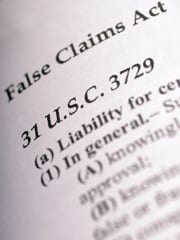Universal Health Services, Inc. v. Ex Rel. Escobar– SCOTUS opinion, 136 S. Ct. 1484 (2016); Implied False Certification and “Materiality” under the False Claims Act
Having recently attended a fabulous qui tam seminar sponsored by the Charleston School of Law and the Federal Bar Association (and masterfully put together by Joe Griffith of the Charleston County bar), I thought it appropriate to revisit last year’s SCOTUS opinion in Escobar to assess just how much this case changed the landscape on materiality issues in the context of the federal False Claims Act.
The case takes up two, related issues. First, can liability even be predicated on a theory of “implied false certification”? And then, what is the definition of “materiality” under the False Claims Act?
A brief factual background of the case is helpful. In short, a young girl, on Medicaid, was receiving mental health treatment through a subsidiary of Universal Health Services. She was treated and prescribed medications during the course of that treatment. She died. Her family later discovered that these mental health practitioners lacked basic certifications to be performing the kind of work they were performing. Her family brought a qui tam action against Universal Health Services, alleging that the Universal Health Services’ subsidiary made false claims when they filed for Medicaid reimbursement because, by filing for those payments, they “implied” they complied with all applicable statutory and regulatory provisions when they clearly did not.
As to the “implied false certification” theory of liability– the Court held that, “at least in some circumstances” there can be liability predicated on this particular theory. In this case, yes, and that is because the claims presented in this case (to Medicaid, for reimbursement) did more than “merely demand payment.” Instead, these statements “fall squarely within the rule that half-truths– representations that state the truth only so far as it goes, while omitting critical qualifying information– can be actionable misrepresentations.” Id. In other words, in egregious situations like this, there will be liability. The Court held that liability will attach where two conditions are satisfied: “1) the claim does not merely request payment, but also makes specific representations about the goods or services provided, and 2) the defendant’s failure to disclose noncompliance with material statutory, regulatory, or contractual requirements makes those representations misleading half-truths.”
As to the materiality standard under the FCA, the Court notes that the standard is “demanding” and that the FCA is not “an all-purpose antifraud statute” or a vehicle for punishing garden-variety breaches of contract or regulatory violations. The Court tells us quite about what materiality is NOT:
A misrepresentation cannot be deemed material merely because the Government designates compliance with a particular statutory, regulatory, or contractual requirement as a condition of payment. Nor is it sufficient for a finding of materiality that the Government would have the option to decline to pay if it knew of the defendant’s noncompliance…Likewise, proof of materiality can include, but is not necessarily limited to, evidence that the defendant knows that the Government consistently refuses to pay claims in the mine run of cases based on noncompliance with the particular statutory, regulatory, or contractual requirement. Conversely, if the Government pays a particular claim in full despite its actual knowledge that certain requirements were violated, that is very strong evidence that those requirements are not material. Of, if the Government regularly pays a particular type of claim in full despite actual knowledge that certain requirements were violated, and has signaled no change in position, that is strong evidence that the requirements are not material.
In other words, and I think this is good news for defendants, just because the Governments says it’s material, it does not make it so. It appears to me that the Court intends for the lower courts to take a realistic view of the facts on the ground in individual cases to decide if the misrepresentations amount to “half-truths” that are, in the end, “material” to the provider for purposes of the FCA.

